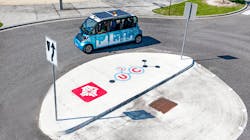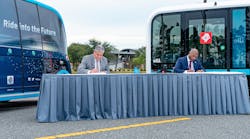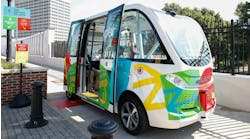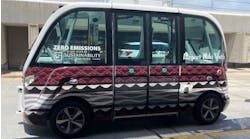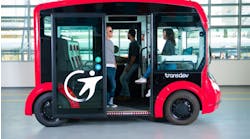Jacksonville Transportation Authority (JTA) and Florida State College at Jacksonville (FSCJ) have launched a new program to expand testing of autonomous vehicles on FSCJ’s downtown campus.
The program builds upon JTA’s and FSCJ’s collective efforts to spotlight the city of Jacksonville on transforming mobility and accessibility, improving roadway safety and positively impacting the environment. This partnership was established in 2020 through a joint Memorandum of Understanding (MOU).
The MOU was aligned to FSCJ’s National Science Foundation grant awards to design and implement innovative curriculum for preparing students to be the workforce of the future in the important areas of autonomous technology and electric vehicle platforms and showcases JTA’s global leadership in urban transportation transformation, which has been widely recognized by the Intelligent Transportation Society World Congress.
The autonomous, electric vehicle service, to be deployed this fall, will provide a new mobility service for students, faculty and visitors on the FSCJ Downtown Jacksonville campus. It will connect the Advanced Technology Center, university president’s office and cafeteria over a one-mile route to enhance movement between the segmented areas of campus.
The project is one of many planned “Agile” programs pioneered by the JTA team to prepare the Jacksonville community for the future of transportation through the Ultimate Urban Circulator (U2C) program. These important projects will validate the wide variety of applications for autonomous vehicles throughout the community ahead of the launch of phase one of the U2C, the Bay Street Innovation Corridor in 2025. Expanding the testing of autonomous vehicles in FSCJ’s downtown campus will also continue to ready the community for how autonomous technology will enhance the quality of life for all who learn, live and work in the city of Jacksonville.
“FSCJ continues to be a vital partner as we advance and socialize autonomous vehicle technology in Jacksonville, both for Bay Street and beyond,” said JTA CEO Nathaniel P. Ford Sr. “In addition to being some of the first to ride autonomous vehicles in Jacksonville, FSCJ students, faculty and campus guests will have an opportunity to provide us with direct feedback as we prepare to launch the Bay Street Innovation Corridor in 2025.”
As part of the autonomous vehicle program, FSCJ’s downtown campus, faculty, staff and students will experience autonomous vehicles operating on campus first-hand. Feedback and learnings from the program will build upon the existing knowledge base of this emerging technology as it continues to develop the FSCJ curriculum, skillset and workforce to support these transformative transportation solutions.
“FSCJ is excited to build upon our strong relationship with JTA as we ready for a future where innovation knows no bounds,” said FSCJ President Dr. John Avendano. “This partnership enables our automotive technology students to be at the forefront of the rapidly evolving industries of autonomous vehicles, electric vehicles and artificial intelligence by integrating these technologies into our academic programming.”
The JTA has been researching and testing autonomous vehicle technologies since 2017. JTA’s efforts to date have greatly impacted development of next generation autonomous platforms and solutions, which will result in the city of Jacksonville being one of the first in the world to deliver on the vision of safe, convenient, autonomous, electric, shared mobility networks to further activate and modernize the downtown area.
The first phase of the U2C program will implement a full-scale autonomous shuttle network with smart and connected technology down Bay Street in 2025. The entire U2C program comprises three main phases. Each will incrementally build out the 10-mile transportation network connecting key downtown Jacksonville corridors, including the Sports/Entertainment District, the Downtown Northbank and Southbank, with branches into surrounding neighborhoods such as Brooklyn, Riverside, San Marco and Springfield.
